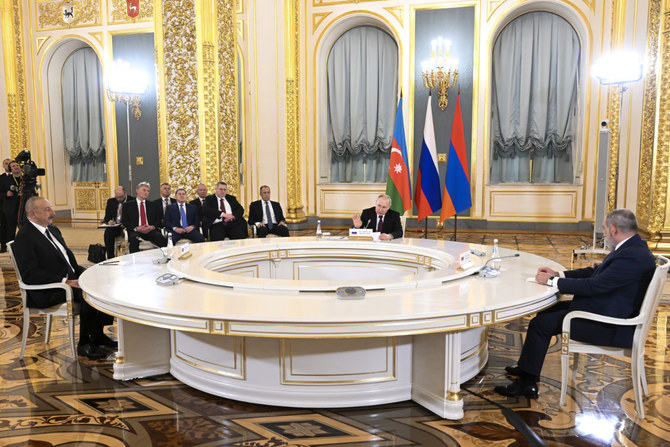
The one-year anniversary of the start of the second Nagorno-Karabakh war between Azerbaijan and Armenia passed this week. By early November of last year, Armenia was defeated by a better-trained and equipped Azerbaijani military. Baku was able to restore its internationally recognized borders and end an Armenian occupation that had lasted for almost three decades.
A few years ago, I visited the front lines of the Nagorno-Karabakh conflict. After walking through a network of Azerbaijani trenches, I entered a bunker. Several hundred meters ahead were the Armenian positions. A few kilometers behind me were the Aras River and Iran. An Azerbaijani officer accompanying me pointed toward the Armenian positions and said: “Someday, we will attack this way.” Then, to my surprise, he pointed toward Iran and said: “And then maybe we will attack this way.” He then smirked and said: “Business before pleasure.” This incident has remained in my mind ever since.
Iran has used the week of the anniversary to conduct large-scale military exercises along its border with Azerbaijan. These military maneuvers are taking place in a section of the Azerbaijani-Iranian border that was under Armenian occupation until last year. Needless to say, these maneuvers have rattled policymakers in Baku.
With so much focus on Iran’s activities in the Middle East, it can be easy to forget Tehran’s role and influence in the South Caucasus. This is particularly true when it comes to Azerbaijan and Armenia. While relations between Baku and Tehran remain cordial on the surface, there are three underlying tensions between the two countries that help explain why Iran’s recent military exercises have caused concern in Azerbaijan.
The first point of tension is the number of ethnic Azerbaijanis living in Iran. The Azerbaijani people were divided between modern-day Azerbaijan and Iran as a result of the 1828 Treaty of Turkmenchay between Imperial Russia and Persia, which ended the Russo-Persian War (1826-1828) and made the new border between the powers the Aras River. Today, Azerbaijanis are thought to be the second-largest ethnic group in Iran, with estimates claiming there are somewhere between 11 and 28 million.
During last year’s conflict between Azerbaijan and Armenia, there was a lot of pro-Azerbaijani rhetoric and protests on social media and on the streets in support of Baku by ethnic Azerbaijanis. The Iranian regime tried to appear balanced during the conflict on the rhetorical level. However, in practice, Iran was the main transit point for all Russian supplies to Armenia during the war.
While relations between Baku and Tehran remain cordial on the surface, there are underlying factors causing problems.
Luke Coffey
Following Azerbaijan’s victory, Baku’s influence in the region is on the rise. There is a constant low-level push for self-determination and increased autonomy in northern Iran for the Azerbaijani minority. Although this has not materialized into a mass movement for independence, it makes some in the Iranian leadership nervous.
The second factor is Azerbaijan’s good relations with Israel, which alarms Tehran. The Azerbaijani town of Qirmizi Qasaba is thought to be the largest all-Jewish settlement outside of Israel. Azerbaijan also provides Israel with 40 percent of its oil. Meanwhile, the Israelis sold to the Azerbaijanis some very capable unmanned aerial vehicles, which proved to be incredibly effective in the war last year.
Clearly, Azerbaijan’s relationship with Israel rattles the Iranians. The military and security aspects of the relationship are particularly concerning to Iran. Responding to Azerbaijani criticism of the recent military exercises, Iranian Foreign Ministry spokesman Saeed Khatibzadeh said in a statement: “The drills carried out by our country… are a question of sovereignty… Iran will not tolerate the presence of the Zionist regime near our borders.”
Finally, Iran’s cozy relationship with Armenia is a sticking point with Baku. For historical, economic and geographical reasons, Yerevan and Tehran have close ties. When access to many international markets was closed off to Iran due to economic sanctions, Armenia was a useful place for Tehran to do business.
There are continuous talks between the leaders of Armenia and Iran to boost trade and economic connectivity. Last month, Iranian President Ebrahim Raisi and Armenian Prime Minister Nikol Pashinyan met to discuss increasing economic cooperation. During the first war in Nagorno-Karabakh in the early 1990s, Iran was sympathetic with Armenia’s cause as a way to marginalize Azerbaijan’s role in the region.
In addition to the Iranian military exercises, tensions between Baku and Tehran have risen in recent weeks after Azerbaijani customs officials began implementing a road tax on Iranian trucks passing through Azerbaijani territory (which was, until last year, under Armenian occupation). It has also transported fuel and other goods to neighboring Armenia and parts of Nagorno-Karabakh that are under the control of Russian peacekeepers.
Considering the fragility of the situation in the South Caucasus, this is a very dangerous time. The last thing the region needs right now is another war.
Luke Coffey is the director of the Douglas and Sarah Allison Center for Foreign Policy at the Heritage Foundation. Twitter: @LukeDCoffey
Disclaimer: Views expressed by writers in this section are their own and do not necessarily reflect Arab News" point-of-view












